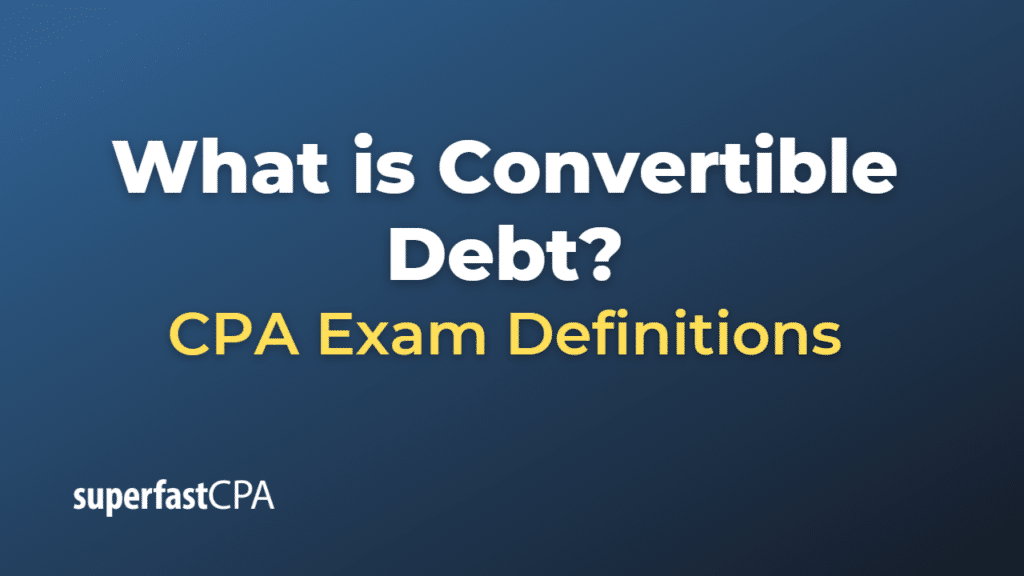Convertible Debt
Convertible debt, also known as convertible loans or convertible notes, is a type of short-term debt instrument issued by a company that can be converted into equity (common shares) at a future date, usually at the discretion of the debt holder. Convertible debt is often used by early-stage companies, particularly startups, as a means of raising capital while deferring the valuation process and minimizing dilution for existing shareholders.
Key features of convertible debt include:
- Interest Payments: Convertible debt typically carries an interest rate, which is often higher than the interest rates on traditional loans due to the risk associated with early-stage companies. Interest payments can be made periodically or accrued and paid at the time of conversion or maturity.
- Maturity Date: Convertible debt has a maturity date, which is the date when the loan is due for repayment. If the debt has not been converted into equity by the maturity date, the company must repay the principal amount along with any accrued interest.
- Conversion Feature: The most distinguishing feature of convertible debt is the option for the debt holder to convert the loan into equity, typically common shares of the company, at a predetermined conversion rate. The conversion can occur at a specific event, such as a subsequent financing round, or at the discretion of the debt holder.
- Conversion Terms: Convertible debt agreements may include conversion terms, such as valuation caps and discounts, to incentivize early investors and protect them from potential dilution in future financing rounds. A valuation cap sets a maximum pre-money valuation at which the debt can be converted, while a discount provides the debt holder with the option to convert the debt into equity at a lower price than that offered to new investors in the subsequent financing round.
Convertible debt is an attractive option for startups and early-stage companies, as it enables them to raise capital without immediately diluting ownership or undergoing a formal valuation process. For investors, convertible debt provides the opportunity to participate in the potential upside of the company through equity ownership, while also offering the downside protection of a debt instrument.
Example of Convertible Debt
Let’s consider a hypothetical example to illustrate how convertible debt works:
Startup ABC is seeking to raise $500,000 in capital to fund its growth and operations. Instead of issuing equity or taking out a traditional loan, the company decides to issue convertible debt to early-stage investors.
Key terms of the convertible debt:
- Principal Amount: Startup ABC issues convertible notes with a total principal amount of $500,000.
- Interest Rate: The notes carry an annual interest rate of 8%, with interest payments accruing and payable upon conversion or at maturity.
- Maturity Date: The convertible debt has a maturity date set 2 years from the issuance date.
- Conversion Feature: The convertible notes will automatically convert into equity during the company’s next financing round, or the debt holder can choose to convert their notes into equity at their discretion.
- Discount: The convertible debt agreement includes a 20% discount on the share price in the next financing round.
Now, let’s assume that after 1 year, Startup ABC raises a new financing round with a pre-money valuation of $5 million and a share price of $1. At this point, the convertible note holders can convert their debt into equity using the 20% discount:
Discounted Share Price = Share Price × (1 – Discount Rate)
Discounted Share Price = $1 × (1 – 0.20)
Discounted Share Price = $0.80
For a note holder with a principal amount of $100,000, the number of shares they would receive upon conversion would be:
Number of Shares = Principal Amount / Discounted Share Price
Number of Shares = $100,000 / $0.80
Number of Shares = 125,000
In this example, the note holder’s investment of $100,000 converts into 125,000 shares of Startup ABC at a discounted share price of $0.80 per share. Additionally, any accrued interest on the convertible debt would also be converted into shares or paid out in cash, depending on the terms of the convertible debt agreement.
This illustrates how convertible debt can provide early-stage investors with the opportunity to participate in the potential upside of a growing company while offering downside protection through the debt instrument.













